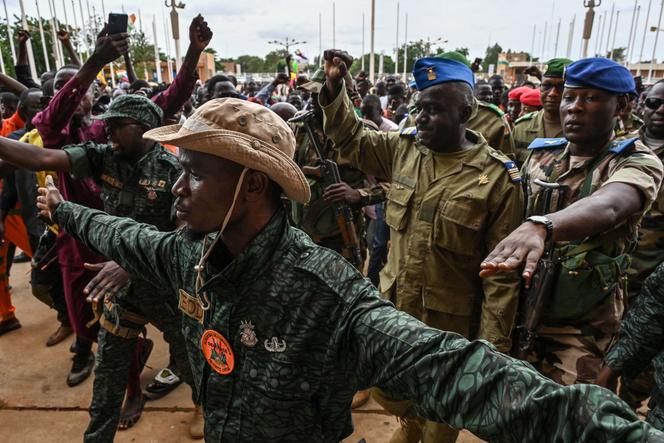


As the deadline issued by the Economic Community of West African States (ECOWAS) passed on Sunday, August 6, the ruling junta in Niger showed no sign of surrendering. The regional organization had given the putschists led by General Abdourahamane Tiani one week to restore President Mohamed Bazoum, who is sequestered in his presidential residence in Niamey since the July 26 coup. After that, "all necessary measures" would be taken, warned ECOWAS, adding the measures may "include the use of force." But across North and West Africa, some voices are calling for the negotiations to be extended.
In a series of messages posted on X (formerly Twitter) on Saturday, July 5, former Nigerien foreign minister Aïchatou Mindaoudou warned against an operation "that will have harmful, inestimable and lasting consequences both in Niger and throughout the sub-region." Algeria, which is not a member of ECOWAS but shares a border of almost 1,000 kilometers with Niger, has also expressed its hostility to an operation which, according to President Abdelmadjid Tebboune, would represent "a direct threat" to his country.
The soldiers of Niger's self-proclaimed National Council for the Safeguard of the Homeland (CNSP), who have promised an "immediate response" to "any aggression," can count on the solidarity of Burkina Faso and Mali. Both countries, also led by juntas, have made it clear that they would consider any armed intervention against their neighbor as a "declaration of war" against themselves as well.
ECOWAS is preparing for an alliance of these juntas, while assuring that the military option will only be used as a last resort. For three days, the organization's military chiefs held discussions in Abuja, Nigeria. "All the elements that will go into any eventual intervention have been worked out here, including the resources needed, and also how and when we are going to deploy the force," said the Commissioner for Political Affairs and Security, Abdel-Fatau Musah, on Saturday. "ECOWAS not going to tell the coup plotters when and where we are going to strike," he added, calling it an "operational decision that will be taken by the heads of state" of the bloc.
But it's not certain that the latter will have a free hand. On Saturday, Nigerian senators, while condemning the coup, openly voiced their concerns. Niger's 1,500-kilometer southern border touches seven Nigerian states, and the Nigerian army would be on the front line in the event of an intervention. "The Senate calls on [Bola Tinubu, the country's president, also current head of ECOWAS] to further encourage other leaders of ECOWAS to strengthen political and diplomatic options and other means with a view to resolving the political impasse," said Godswill Akpabio, the president of the Senate.

Even in Senegal, where the authorities have denounced the coup and clearly announced their intention to participate in a possible military offensive in Niger, dissonant voices have begun to be heard in the political class. Opposition MP Thierno Alassane Sall, a former minister, warned on Saturday of the risk of provoking "one of the deadliest wars in the sub-region," and called on the presidential majority not to commit the country without the support of the National Assembly.
In Côte d'Ivoire, there is little debate on the subject. The country has been in mourning since the death of former president Henri Konan Bédié on August 1. In his address to the nation, delivered on the eve of the 63rd anniversary of the country's independence, Ivorian President Alassane Ouattara merely condemned an "attempted coup d'état in Niger, which constitutes a serious threat to peace and security in the sub-region."
"Of course," he added, "We support ECOWAS initiatives to re-establish constitutional order in this brother country and to allow President Mohamed Bazoum, the democratically elected president, to exercise his functions freely." According to the Ivorian Constitution, Parliament must be consulted before a declaration of war. "But if a vote were to take place," predicted Ivorian political scientist Arthur Banga, who specializes in defense and security issues, "it would pass without a hitch."
However, the legal framework for any intervention by West African armies in Niger has yet to be clearly defined. "The United Nations Security Council retains the 'primary responsibility' for the maintenance of international peace and security," said Julien Antouly, a researcher in the law of armed conflict. In the case of Niger, it is highly unlikely that the body will decide in favor of a military operation.
"The second option," said the legal expert, "would be an operation under ECOWAS mandate." The regional organization has protocols governing this type of mission in the event of an unconstitutional change in a member state. But could it do without the opinion of the Security Council? The question is open to debate. "In Sierra Leone, it obtained a posteriori authorization from the United Nations, and in Gambia, it enjoyed implicit authorization since the Council had not condemned the intervention," said Antouly.
In such a framework, non-ECOWAS member states such as France or the USA would not be legally able to claim an ECOWAS mandate to act. That leaves a third option: that of a head of state asking allies to intervene. In the case of Niger, this would mean considering that President Mohamed Bazoum is still in power, even though he and several of his ministers are being held hostage. Furthermore, said Antouly, "Intervention at the request of a state is limited to external aggression or imperatives such as the fight against crime or terrorism. It cannot be used to settle internal political controversies."
Translation of an original article published in French on lemonde.fr; the publisher may only be liable for the French version.
